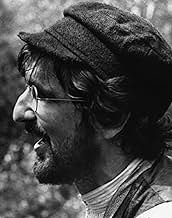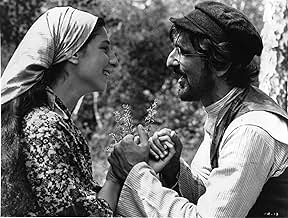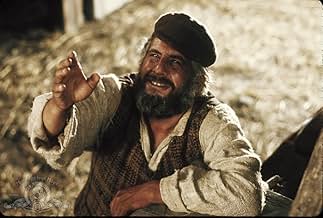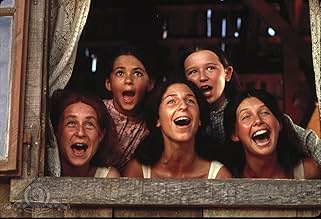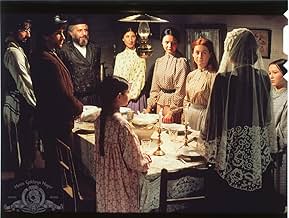In 1905 Russia, a traditionalist Jewish peasant contends with three of his daughters marrying men with modern romantic ideals, all while anti-Semitic sentiment threatens his village.In 1905 Russia, a traditionalist Jewish peasant contends with three of his daughters marrying men with modern romantic ideals, all while anti-Semitic sentiment threatens his village.In 1905 Russia, a traditionalist Jewish peasant contends with three of his daughters marrying men with modern romantic ideals, all while anti-Semitic sentiment threatens his village.
- Director
- Writers
- Stars
- Won 3 Oscars
- 10 wins & 14 nominations total
Paul Michael Glaser
- Perchik
- (as Michael Glaser)
Ray Lovelock
- Fyedka
- (as Raymond Lovelock)
- Director
- Writers
- All cast & crew
- Production, box office & more at IMDbPro
8.051.2K
1
2
3
4
5
6
7
8
9
10
Featured reviews
A wonderful story
The story took place in the village of Russia, 1904. It centered around the leading role, Tevya, who was diaryman. Tevya was a enlightened old man, he had open-minded thought and he deeply loved his three daughters. When he looked into the future of the daughters who were unmarried, he always sang the song "If I am the rich" very kindly, because he fervently expected that they got a bright future.
In the beginning, Tevya was trying to marry off Tzietel, the oldest daughter. The matchmaker found her a matcher in Lazar Wolfm the butcher. However, the butcher was much older than Tzietel, and she didn't love him. she loved a poor tailor, and they promised to each other that they would get married. At last Tevya said yes to them. Meanwhile the second child Hodel, and a poor student also fell in love soon, and they got engaged. They informed her father this and he gave them permission to be married. The poor student was arrested for demonstrating, and was sent to a distant prison, Hodel left to join there. Last, the last daughter , Chava and Fyedka fell in love. Chava told Tevya, and he was outraged, because she wanted to marry out of the faith. She got married anyway, and Tevya disowned her. Soon after that, all of the Jewish people in Anatevka got a notice to move out. And that's the end of the play. Ir's a kind of sad ending.
In the beginning, Tevya was trying to marry off Tzietel, the oldest daughter. The matchmaker found her a matcher in Lazar Wolfm the butcher. However, the butcher was much older than Tzietel, and she didn't love him. she loved a poor tailor, and they promised to each other that they would get married. At last Tevya said yes to them. Meanwhile the second child Hodel, and a poor student also fell in love soon, and they got engaged. They informed her father this and he gave them permission to be married. The poor student was arrested for demonstrating, and was sent to a distant prison, Hodel left to join there. Last, the last daughter , Chava and Fyedka fell in love. Chava told Tevya, and he was outraged, because she wanted to marry out of the faith. She got married anyway, and Tevya disowned her. Soon after that, all of the Jewish people in Anatevka got a notice to move out. And that's the end of the play. Ir's a kind of sad ending.
A Gentile who loves the movie and always sheds tear
I LOVE this musical but I weep a little always for the Yiddish culture lost forever. The world is so much poorer.
I apologise for straying from the artistic merit to linger on the loss to Humanity
Nevertheless this film is a permanent record of the fact that we enjoyed a wondrous Yiddish culture in our midst in Europe but after a series of Pogroms culminating in the Holocaust the heart was ripped out of our culture here in Europe
The music, the humour, the humanity, gone forever from the Heart of Europa. Europe's loss
Irish Gentile
I apologise for straying from the artistic merit to linger on the loss to Humanity
Nevertheless this film is a permanent record of the fact that we enjoyed a wondrous Yiddish culture in our midst in Europe but after a series of Pogroms culminating in the Holocaust the heart was ripped out of our culture here in Europe
The music, the humour, the humanity, gone forever from the Heart of Europa. Europe's loss
Irish Gentile
A Musical "Tradition!"
"Fiddler On the Roof" is the stage-to-screen adaptation of the famous musical. It tells the story of Tevye, a poor Jewish milkman in the tiny Russian village of Anatevka. This role is played by Topol, who played the character onstage in the London production of "Fiddler." We see him as a man mired in traditions, but struggling between his devout faith and the changing times when three of his daughters feel the urge to marry. The movie is beautifully shot, and tempers the story, which deals with the harsh realities of Jewish life in pre-Revolutionary Russia, with classic musical numbers sure to put a smile on your face. Between its incarnations on the stage and on screen, "Fiddler" will be immortal.
From a Goy: One of the best films ever made.
Let me say up front, I am not predisposed to enjoy a movie like this. On the contrary, as a straight WASP, the last thing I want to watch is a broadway musical or a bunch of Jews 'kavetching' about how bad they have it. That is definitely NOT what this film is about. Though the subject matter is Jewish, to say it is a Jewish film would grossly limit it's significance. It is about the human experience. Any one who has felt pain and persecution will relate to it. Therefore I say every human should love this film. It has an indomitable optimism and remarkable pathos that causes the viewer to empathize with the characters, namely Reb Tevye, played by Topol in arguably one of the finest dramatic performances ever. Considering the lack of success Topol has had with the rest of his career it would literally seem he was born to play this part. This film will most likely not be enjoyable for those looking for spoon fed, mindless entertainment or titillation, but for anyone who appreciates the beautiful things in life, it is high art. I recommend you set aside an undisturbed block of time, (use the can first, it's three hours long) when you are feeling relaxed, eat some good homemade soup and watch this masterpiece. Perfect casting, cinematography, pacing, art direction, wardrobe and best of all, an exquisite soundtrack by the great, and very young, John Williams. Listen to this movie on a powerful sound system and it will sweep you into each musical number. Especially (my favorite) the bar room dance scene. Fiddler on the Roof should be on every top 100 list that exists. Like no other movie I can think of, 'Fiddler' reaches deep into the heart and begs one to look at what things in life are worth living for and dying for.
10Spleen
One of the best of all musicals
The range and audacity of `Fiddler on the Roof' is stunning. By comparison today's musicals are timid, quaking things, terrified of frightening their audiences away however much `social relevance' bravado they may assume. This old musical is older than it looks. The film dates from 1971; the musical itself from 1963; but even then it was clear that it was the last of its kind, a delayed swan-song from the 1950s. There's sentiment, but no promise of a happy ending; humour, but not a trace of postmodern knowingness; realism, but and a willingness to indulge in fantasy, too. Musicals can't really survive without fantasy, and `Fiddler', along with `West Side Story', may very well mark the limit of just how serious it is possible to get without losing it. The songs are uniformly good. I don't know if Bock's music was usually so fitting, or if he happened to strike gold just once - not that it matters.
As for the film ... I only wish I'll get a chance to see it in a cinema, for the photography is beautiful - and it IS the photography that's doing it, since we're made to realise that neither the village nor its setting is picturesque in itself. Norman Jewison has assembled a cast not one member of which jars and makes the most of it. This film is quite long, and feels longer, but neither length nor apparent length is a liability.
As for the film ... I only wish I'll get a chance to see it in a cinema, for the photography is beautiful - and it IS the photography that's doing it, since we're made to realise that neither the village nor its setting is picturesque in itself. Norman Jewison has assembled a cast not one member of which jars and makes the most of it. This film is quite long, and feels longer, but neither length nor apparent length is a liability.
Soundtrack
Preview the soundtrack here and continue listening on Amazon Music.
Did you know
- TriviaThe "Sunrise, Sunset" scene was not lit by electric movie lights but by hundreds of candles, by Cinematographer Oswald Morris. Years later, Norman Jewison said it was the best lit scene in any of his films.
- GoofsWhen the old man is talking to Tevye about Tzeitel, the shadow of the microphone boom is visible on the old man's shirt.
- Crazy creditsTopol and the cast sing "Tradition" without any opening credits rolling. At the end of the number, the fiddler standing on the left of the screen launches into an extensive solo while the opening credits roll on the right of the screen.
- Alternate versionsOriginally released at 181 minutes (with an intermission); later trimmed for 1979 reissue to 149 minutes.
- ConnectionsEdited into 5 Second Movies: Fiddler on the Roof (2008)
- SoundtracksTradition
(1964) (uncredited)
Music by Jerry Bock
Lyrics by Sheldon Harnick
Performed by Topol and Chorus in the pre-credits sequence
Details
- Release date
- Country of origin
- Languages
- Also known as
- Violinista en el tejado
- Filming locations
- Lekenik, Croatia(Anatevka)
- Production companies
- See more company credits at IMDbPro
Box office
- Budget
- $9,000,000 (estimated)
- Gross US & Canada
- $10,404,330
- Opening weekend US & Canada
- $1,726,942
- Nov 11, 1979
- Gross worldwide
- $10,407,890
- Runtime
- 3h 1m(181 min)
- Color
- Aspect ratio
- 2.35 : 1
Contribute to this page
Suggest an edit or add missing content






